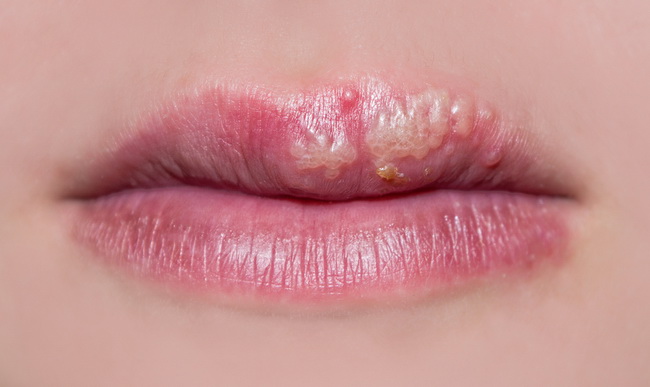- Make It Yourself Lavender Heart-Shaped Bath Bombs!
- 20 Things You Never Knew About “Down There”
- 12 Best Foods For Those Suffering From Arthritis Pain
- 12 Personal Hygiene Mistakes Almost Everyone Makes (Mom Never Told You About #4!)
- 15 Medicinal Plants And Herbs From The Cherokee People
- 12 Mind-Blowing Benefits Of Drinking Coconut Water During Pregnancy
- 12 Outstanding Winter Foods That Won’t Fatten You Up Like A Christmas Turkey
The Real Truth About Herpes

Photo credit: bigstock.com
If you are a sexually active adult, chances are you have heard about the sexually transmitted disease, or STD, called herpes. You know enough about it to know that you don’t want to end up with it because there is no cure. But there is so much more information that you are probably not aware of. This article will provide you with the correct data to replace the fallacies you may have heard as well as give you the truth about this serious disease.
What is herpes and the different types?
Herpes is a group of viruses that consist of eight different versions. You may have had one type of this disease in your lifetime as the chicken pox virus is a form of herpes. Here is information on each one of them.
- Type 1 (HSV-1) Considered simplex one, this form of herpes creates oral herpes and can also be spread to the eyes, or the genitals, through oral sex. Symptoms of this version are sores or blisters around the mouth. It is spread through physical contact, kissing, sharing food, forks, spoons, or straws especially when the blister or cold sore are visible.
- Type 2 (HSV-2) This type is considered genital herpes, one of the most common infections of the sexually transmitted diseases. It is transmitted through sexual contact and you could have it without the sores being visible.
- Type 3 (HSV-3) It is referred to as Varicellus-zoster and is better known as chickenpox. If you have had chickenpox as a child the virus stays in your body and can show up later as shingles.
- Type 4 (HSV-4) This version is easily recognized as Epstein-Barr, which can leave you with mononucleosis or an even more dangerous condition called Hodgkin’s lymphoma. This type of herpes is spread by sharing food, beverages, and by mouth.
- Type 5 (HHV-5) This type has no known symptoms for healthy people. Pregnant women need to be careful as well as anyone with an unhealthy immune system.
- Type 6 and 7 (HHV-6 HHV-7) These types are common types of the virus that are prevalent in childhood. The condition is called roseola infantum and consists of a rash and a fever.
- Type 8 (HHV-8) While this type of herpes can turn in to cancer, Kaposi’s sarcoma is more commonly found in those with AIDS.
Keep reading the facts you may not know about herpes!
Continue to Page 2

Photo credit: bigstockphoto.com
Facts you may not know about herpes
1. If you can’t see an outbreak you can’t get herpes.
This is not true. Sometimes an outbreak might be mistaken for something else.
2. If you have herpes, you can’t have children.
This is not true. Herpes has nothing to do with reproduction.
3. If you have herpes you are always contagious.
This is not true. You are only contagious when you can actually see the virus on the skin.
4. Using a condom will prevent getting herpes.
While it is not 100 percent reliable, it is worth using a condom to cut down on your chances of getting or spreading herpes.
5. My test showed I didn’t have herpes – am I safe?
No, it can take up to two weeks for it to show up on a test. It also could take a couple of months for the symptoms to show up.
KEEP READING: 15 Effective Ways To Treat Herpes Outbreaks (#8 Is Kinda Cool!)
The main thing to remember about herpes is to be extremely careful. There are many versions of this disease that will leave you with a reminder every time you have an outbreak. Once you get genital herpes you will always have them. Better you are safe and use a condom so you don’t get it rather than have to endure them for the rest of your life.
References:

































Anto
Mar 13, 2017 at 6:34 pm
I have found that clay powder is a good treatment. Make a paste with water and spread it on the sore. It will insulate it and may help remove the virus from the area to accelerate healing, at the same time providing soothing relief.
The clay I use is the green one, available in bulk from organic produce stores. Also, the packaged diatomaceous clay from health food shops. The two seem to be fairly equally effective – may actually be the same material.
It seems that having a herpes outbreak is itself a fairly helpful protection against future outbreaks, provided you look after your health conscientiously. I once had a cold sore on my lip and after it went away I’ve never had another herpes episode in 30 years. Also my partner of 10 years had genital herpes outbreaks from time to time without my apparently catching it, though I had a blood test when we eventually separated and it was positive for that strain of herpes but again – no symptoms. (I should explain I’m a bit of a health nut.)
Our immune systems will protect us against infectious diseases as long as we take care of our health. It’s pretty simple: Healthy diet, adequate sleep and rest, daily exercise, avoiding environmental toxins, daily sunshine when possible (in the middle of the day for 5-10 minutes each side while naked and lying down, not standing and clothed). Chew slowly at mealtimes, small mouthfuls, don’t drink fluids for an hour before and an hour and a half after meals, eating no more than three times a day – two is better.
Alcohol – no. Smoking – no. Vaccines – no. Other pharmaceutical drugs – as a last resort maybe, otherwise no.